In the shown figure, there are two long fixed parallel conducting rails (having negligible resistance) and are separated by distance L. A uniform rod of resistance R and mass M is placed at rest on frictionless rails. Now at time t=0, a capacitor having charge Q0 and capacitance C is connected across rails at ends a and b such that current in rod (cd) is from c towards d and the rod is released. A uniform and constant magnetic field having magnitude B exists normal to plane of paper as shown. (Neglect acceleration due to gravity)
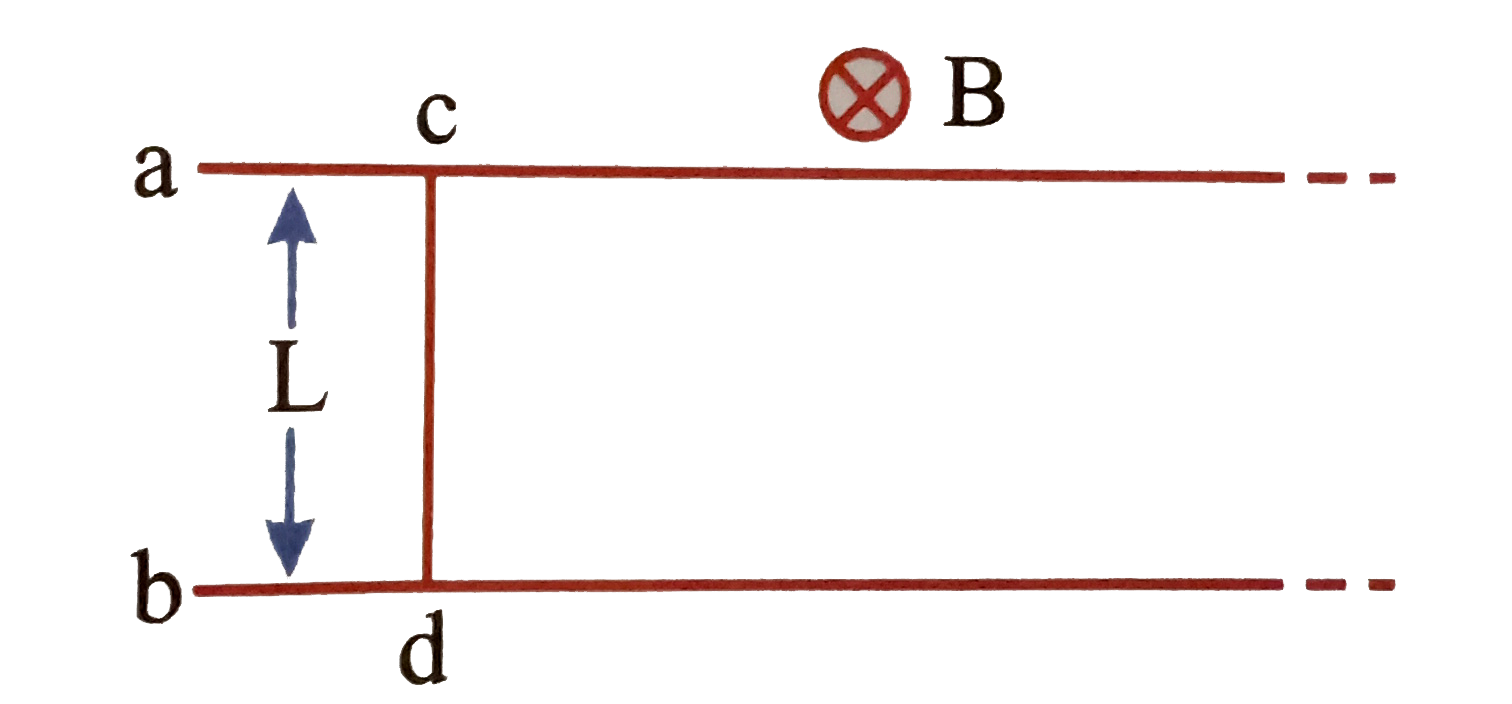
When the acceleration of rod is zero, the charge on capacitor is:
B2L2CQ0M+B2L2C
B2R4C3Q0M+B2L2C2
B2R4C3Q0M+B2R4C4
B2L2CQ0M+B2L2C2
The correct Answer is:A
At any instant t, the charge on capacitor q, velocity of rod v and the current I through rod are as shown.
mdvdt=BIL=B(−dqdt)L ...(1)
Ϸ underset(0)overset(v) (int) m d v = -underset(Q_(0))overset(q)(int)BL dq
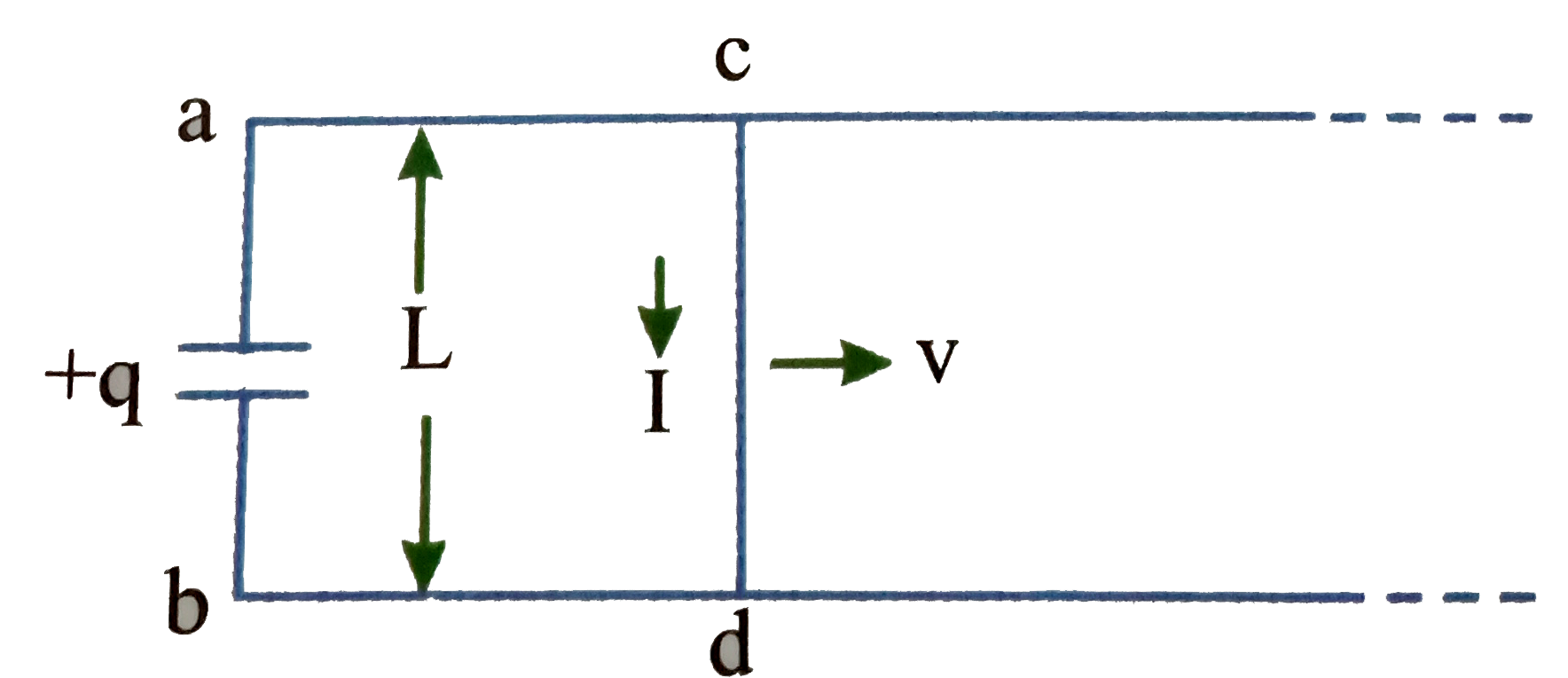
solving we get q=Q0−MvBL ...(2)
Also, qC=BLV+IR=BLv−Rdqdt ...(3)
form equaiton (1) and (3)
qC=BLv+mRBLdvdt .....(4)
from (4) when dvdt=0Ϸ=qC=BLv ......(5)
From (2) and (5). At instant acceleration is zero
v=Q0LBM+B2L2C and q=B2L2CQ0M+B2L2C
Topper's Solved these Questions
- ELECTRO MAGNETIC INDUCTIONBOOK - NARAYNACHAPTER - ELECTRO MAGNETIC INDUCTIONEXERCISE - Single Answer Questions Level -VI
13 Videos
- ELECTRO MAGNETIC INDUCTIONBOOK - NARAYNACHAPTER - ELECTRO MAGNETIC INDUCTIONEXERCISE - Integer type questions
2 Videos
- ELECTRO MAGNETIC INDUCTIONBOOK - NARAYNACHAPTER - ELECTRO MAGNETIC INDUCTIONEXERCISE - Single Answer Questions Level -V
11 Videos
- ELECTRIC CHARGES AND FIELDSBOOK - NARAYNACHAPTER - ELECTRIC CHARGES AND FIELDSEXERCISE - EXERCISE -4
43 Videos
- ELECTRO MAGNETIC WAVESBOOK - NARAYNACHAPTER - ELECTRO MAGNETIC WAVESEXERCISE - LEVEL-II(H.W)
14 Videos
Similar Questions
A rectangular loop of wire with dimensions shown in figure is coplanar with a long wire carrying current 'I'. The distance between the wire and the left side of the loop is r. The loop is pulled to the right as indicated. What are the directions of the induced current in the loop and the magnetic forces on the left and right sides of the loop when the loop is pulled ?
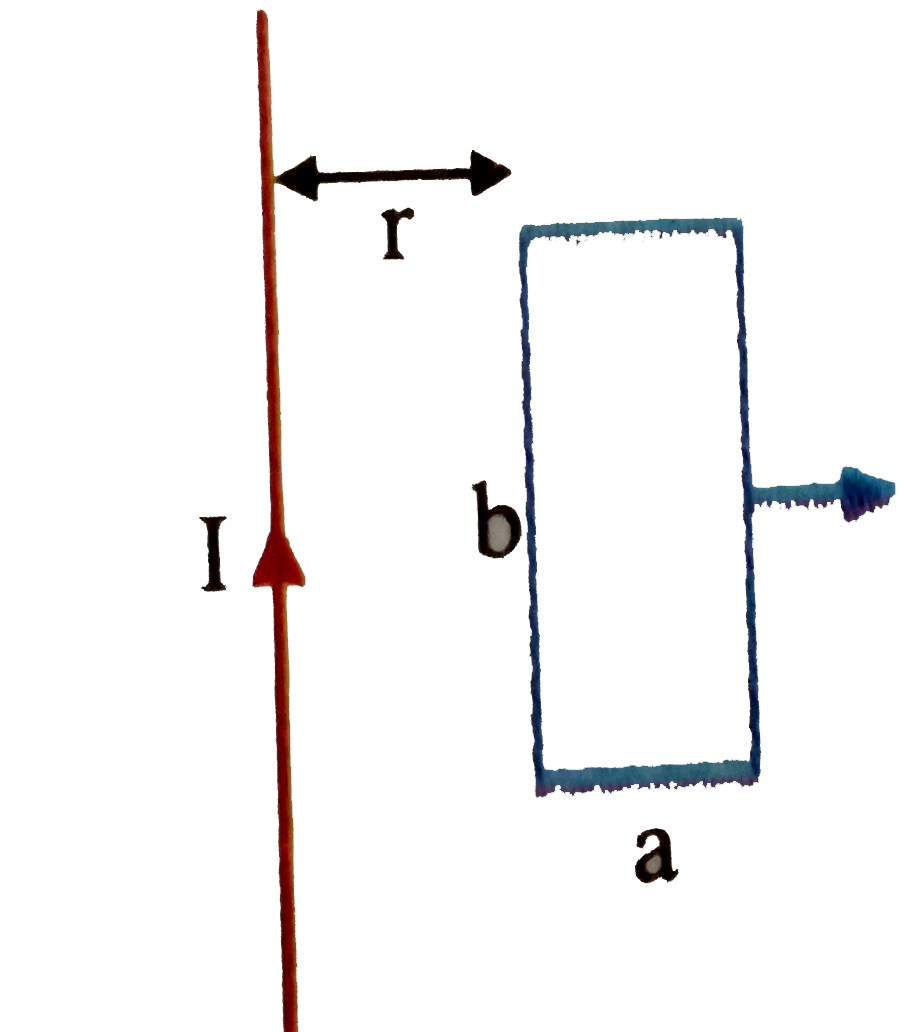
View SolutionIn the figure, a conducting rod of length l=1 meter and mass m=1kg moves with initial velocity u=5m/s. On a fixed horizontal frame containing inductor L=2H and resistance R=1W. PQ and MN are smooth, conducting wires. There is a uniform magnetic field of strength B=1T. Initial there is no current in the inductor. Find the total charge in coulomb, flown through the inductor by the time velocity of rod becomes vf=1m/s and the rod has travelled a distance x=3 meter.
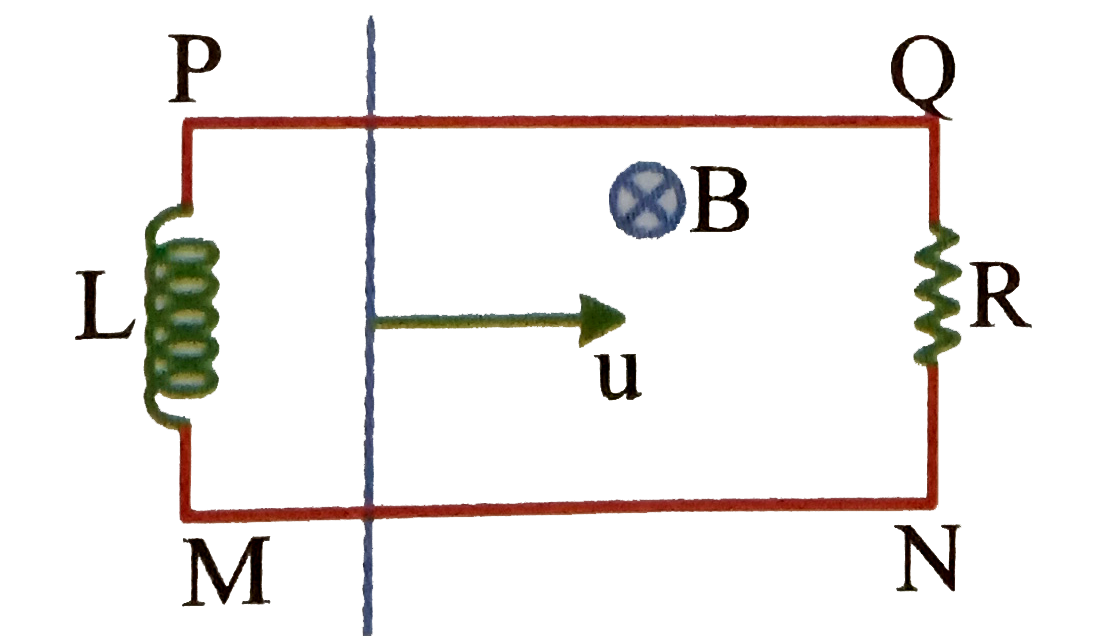
View SolutionA helicopter has metallic blades with a length pf 3m extending outward from a central hub and rotating at 2rev/s. If the vertical component of the earht's magnetic field is 50μT, then the emf induced between the blade tip and the centre hub is
View SolutionAn electron moving towards the east enters a magnetic field directed towards the north. The force on the electron will be directed
View SolutionThe area of each plate of parallel plated condenser is 144cm2. The electrical field in the gap between the plates changes at the rate of 1012Vm−1s−1. The displacement current is
View SolutionA conducting rod of length is moved at constant velocity v0 on two parallel, conducting, smooth, fixed rails, that are placed in a uniform constant magnetic field B perpendicular to the plane for the rails as shown in Fig. A resistance R is connected between the two ends of the rails.
Then which of the following is/are correct:

View SolutionA metallic rod of mass m and resistance R is sliding over the 2 conducting frictionless rails as shown in Fig. An infinitely long wire carries a current I0. The distance of the rails from the wire are b and a respectively.
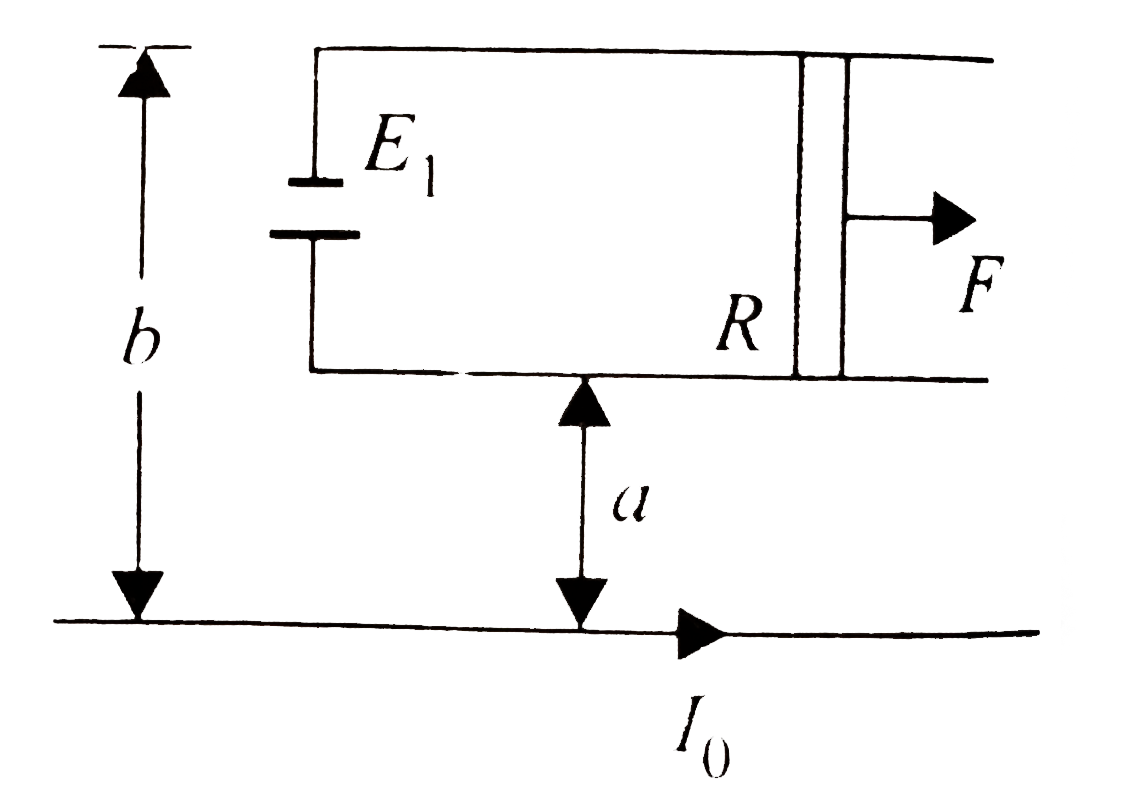
Find the value of current in the circuit if the rod slides with constant velocity v0
View SolutionIn the shown figure, there are two long fixed parallel conducting rails (having negligible resistance) and are separated by distance L . A uniform rod of resistance R and mass M is placed at rest on frictionless rails. Now at time t = 0 , a capacitor having charge Q_(0) and capacitance C is connected across rails at ends a and b such that current in rod (c d) is from c towards d and the rod is released. A uniform and constant magnetic field having magnitude B exists normal to plane of paper as shown. (Neglect acceleration due to gravity) When the speed of rod is v , the charge on capacitor is :
View SolutionIn the shown figure, there are two long fixed parallel conducting rails (having negligible resistance) and are separated by distance L . A uniform rod of resistance R and mass M is placed at rest on frictionless rails. Now at time t = 0 , a capacitor having charge Q_(0) and capacitance C is connected across rails at ends a and b such that current in rod (c d) is from c towards d and the rod is released. A uniform and constant magnetic field having magnitude B exists normal to plane of paper as shown. (Neglect acceleration due to gravity) When the acceleration of rod is zero, the speed of rod is :
View SolutionA conducting rod MN of mass m and length 'l' is placed on parallel smooth conducting rails connected to an uncharged capacitor of capacitance C and a battery of emf epsilon as shown. A uniform magnetic field B is existing perpendicular to the plane of the rails. The steady state velocity acquired by the conducting rod MN after closing switch S is (neglect the resistance of the parallel rails and the conducting rod)
View SolutionIn the shown figure, there are two long fixed parallel conducting rails (having negligible resistance) and are separated by distance L.A uniform rod of resistance R and mass M is placed at rest on frictionless rails. Now at time t = 0, a capacitor having charge Q_(0) and capacitance C is connected across rails at ends a and b such that current in rod(cd) is from c towards d and the rod is released. A uniform and constant magnetic field having magnitude B exists normal to plane of paper as shown. (Neglect acceleration due to gravity) When the acceleration of rod is zero, the speed of rod is :
View SolutionA pair of long conducting rails are held vertical at a separation l = 50 cm . The top ends are connected by a resistance of R = 0.5 Omega and a fuse (F) of negligible resistance. A conducting rod is free to slide along the rails under gravity. The whole system is in a uniform horizontal magnetic field B = 1.5 T as shown. Resistance of the rod and rails are negligible and the rod remains horizontal as it moves. The rod is released from rest. Find the minimum mass of the rod that will ensure that the fuse blows out. It is known that rating of the fuse is 4 A.
View SolutionFigure-5.39 shows two vertical smooth rails AB and CD separated by a distance l. Ends A and C are connected with capacitor of capacitance C. A rod PQ of mass m is horizontally kept in touch with both rails as shown. If it is released at t=0 and it remains in contact with rails during its fall, find the charge on capacitor as function of time. Neglect resistance of connecting wires and rails.
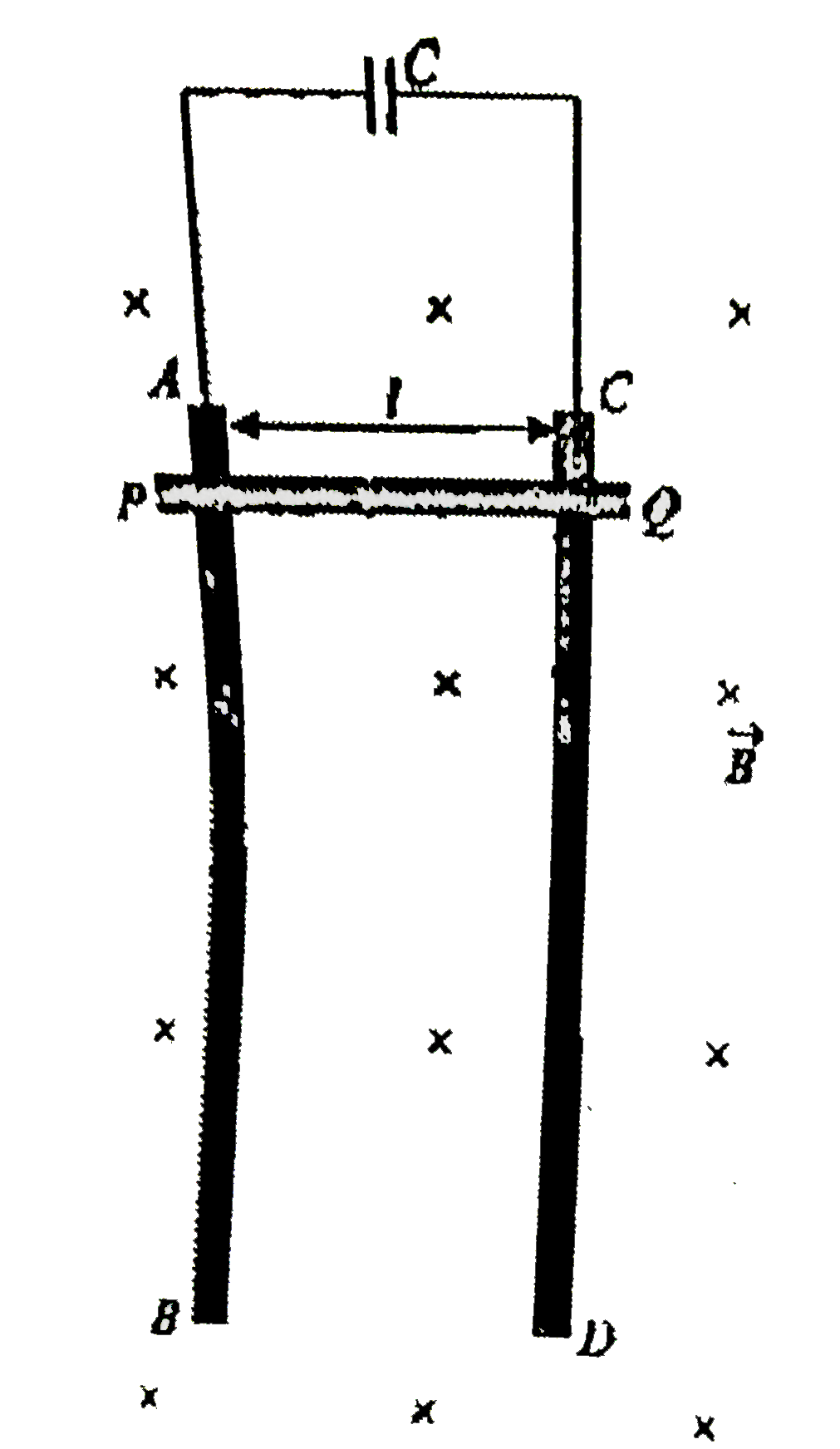
View SolutionIn the figure shown a conducting rod of length l, resistance R and mass m is moved with a constant velocity v. The magnitude field B varies with time t as B=5t, what t is time in second. At t=0 the area of the loop containing capacitor and the rod is zero and the capacitor is uncharged. the rod started moving at t=0 on the fixed smooth conducting rails which have negligible resistance. Find the current in the circuit as a function of time t.
View SolutionA rod with resistance R lies across frictionless conducting rails in a constant uniform magnetic field →B, as shown in the following figure. Assume the rails have negligible resistance. The magnitude of the force that must be applied by a person to pull the rod to the right at constant speed v is
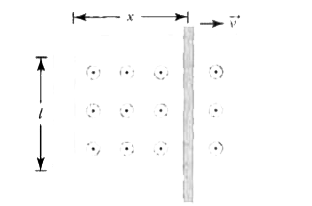
View Solution
